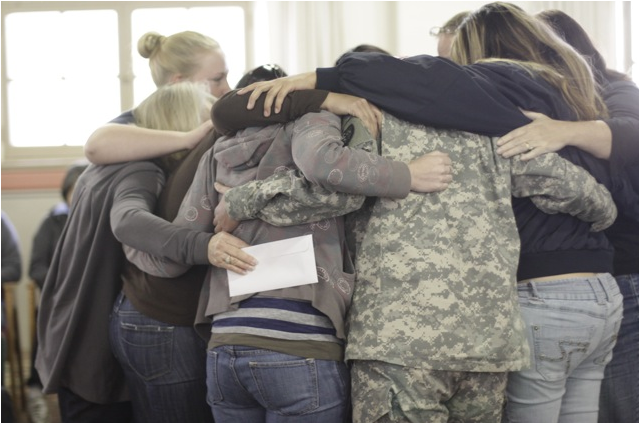
Let me tell you a story from the book, Outliers: In the 1950's a physician
discovered a small town in eastern Pennsylvania where there was virtually no heart
disease under age 65, no suicide, alcoholism, drug addiction, peptic ulcers, and
very little crime. People died from old age. Researchers conducted a thorough
study and found that the usual suspects -- diet, exercise, genetics and location
- were not at play. Then they began to notice how the town folk interacted: how
they visited with one another, stopping to chat on the street, how they cooked for
each other in their backyards, and shared three-generation meals. They learned
about the extended family clans underlying the town's social structure. They
observed the egalitarian ethos of the community, which helped everyone feel
safe and connected.
Townspeople seemed to be healthy because they had created for themselves a powerful,
protective social structure capable of inoculating them from the pressures of the
modern world. The message is: to understand the secrets of health we have to
look beyond the individual in isolation and understand the culture that he or she
is part of. How much help can such an approach be with our vets returning home
from the nation's wars?

Let me share a few snapshots from our first Coming Home Project retreat in
2007 that demonstrate the power of community in action (Coming Home is a
non-profit organization providing holistic services for veterans who have served
in Iraq and Afghanistan, their families, and their service providers):
Kenny and Rory are Iraq veterans who each sustained severe traumatic brain
injuries. One was shot in the head, the other was hit by an IED. When they meet
for the first time at our retreat, they are like long-lost brothers. Since neither can
see much, they come up real close, touching each other's wounds, comparing
scars and experiences, making a deep emotional connection. Stephanie, isolated
in Houston where she lives with the legacy of her husband Michael's death,
is taken in like family within minutes by other spouses. During the opening
moments of silence, as we remember those unable to be with us. Stefanie and
Michael's three-year-old son Ben is playing around the edges of our circle with
his new friend Isiah. Amidst the reverent quiet, we hear Ben say, "My daddy
died in Iraq." Michael, an Army captain, had actually killed himself six months
after returning from serving. From the mouths of babes, the first words spoken
at a Coming Home gathering are precocious: Something indeed had died inside
Michael while in Iraq, something he could not get help for.
Human beings are wired for connection. War-related trauma derails these
natural connections with impacts that are like the shockwaves from an IED
blast. They dismantle connections among family members, peers and friends,
communities, and within nervous systems, hearts and souls. Reintegration is not
an abstraction; it means rebuilding these compromised connections. Coming
Home retreats create a culture in which the wounds of war are enveloped
in a non-judgmental community that holds participants in its arms with an
unconditionally loving embrace. Retreats develop aliveness, bonding, emotional
regulation, meaning and purpose. They are not therapy but they are therapeutic,
creating a safe community of belonging where veterans and their families share
their stories, practice wellness skills, enjoy expressive arts and recreation in
beautiful natural settings, and partake of a secular ritual that honors and helps
integrate experiences. The fear of stigma vanishes and participants connect
with resources in their communities and with opportunities for meaningful public
service and dialogue with civilians. Retreats are peer support driven and guided
by trained teams of therapists, chaplains, veterans and family members.
What we cannot hold, we cannot process. What we cannot process, we cannot
transform. What we cannot transform haunts us. It takes other minds and hearts
to help us heal our own, to help us grow the capacities we need to transform
suffering. This is done in concert, reweaving the web of connective emotional,
relational and spiritual tissue that cumulative trauma tears asunder. With an
informed, responsive culture, it is possible to transform ghosts into ancestors,
to make what haunts us something we can hold and properly remember. This
opens up the present once again, and the future as well.
Coming Home has now held 22 retreats for over 2,000 veterans, service
members and their families and providers from 45 states in the U.S. and
installations abroad. Next year, Coming Home is pioneering programs that
integrate in-person retreats with opportunities for participants to stay connected,
no matter their geographic location, to build on the face-to-face support and
education, and to come together again for public service and dialogue with
civilians and their families.
Concealed within war-related trauma often lies great strength. Its current runs
deep but its resources need to be nurtured. It is like a seed that has been
buried in a disaster; it needs tending, attending. When the great Redwoods are
damaged in a fire, their seedpods are not destroyed. There is clearly devastation,
but often the forest can return to health, with protection, care and skill. The seeds
of renewal and transformation are there -- if we cultivate the intention to be of
help, if we take the time and energy to listen and connect, if we realize that the
responsibility for healing, the impact of war is collective. It takes a village and it
begins with each of us.
